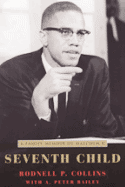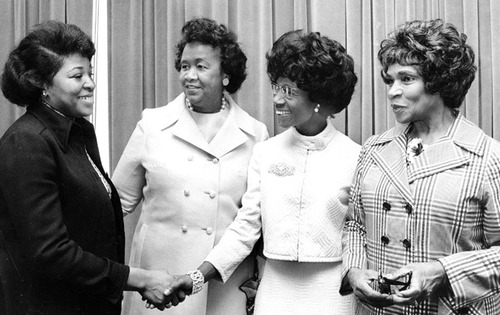On this day in 1942, Curtis Mayfield was born.
Black History Fact Of The Day: Happy Birthday, Curtis Mayfield
Quote Of The Day
Video Of The Week: Betty Shabazz Being Interviewed After The Assassination Of Malcolm X
Black History Fact Of The Day
 Jesse Russell is the pioneer of the field of digital cellular communication. He holds over 100 patents. His patents include: the mobile data telephone, the wireless communication base station, and the multi-network client device for wideband multimedia access to private and public wireless networks.
Jesse Russell is the pioneer of the field of digital cellular communication. He holds over 100 patents. His patents include: the mobile data telephone, the wireless communication base station, and the multi-network client device for wideband multimedia access to private and public wireless networks.
Quote Of The Day
A Picture Is Worth A Thousand Words Pic Of The Week
Black History Fact Of The Day
 Gabriel Prosser, was a literate enslaved blacksmith who planned and led a large slave rebellion in the Richmond area in the summer of 1800. Governor James Monroe and the state militia suppressed the rebellion. Gabriel and 26 other enslaved people who participated were hanged. In reaction, the Virginia and other legislatures passed restrictions on free blacks, as well as the education, movement and hiring out of the enslaved.
Gabriel Prosser, was a literate enslaved blacksmith who planned and led a large slave rebellion in the Richmond area in the summer of 1800. Governor James Monroe and the state militia suppressed the rebellion. Gabriel and 26 other enslaved people who participated were hanged. In reaction, the Virginia and other legislatures passed restrictions on free blacks, as well as the education, movement and hiring out of the enslaved.
In 2002 the City of Richmond passed a resolution in honor of Gabriel on the 202nd anniversary of the rebellion.
Quote Of The Day
Book Excerpt Of The Week: “Seventh Child: A Family Memoir Of Malcolm X” By: Rodnell P. Collins
 “Malcolm was led to his position by his vast knowledge of Black history in the United States. He constantly reminded us that the highly praised U.S. Constitution not only did not recognize human rights of Black people; it did not even acknowledge our ancestors as full human beings. To placate southern enslavers concerned about their representation in the House of Representatives, the “freedom loving” Christian founding fathers decided that each African would be counted as three-fifths of a person. Is there any other written constitution in world history that described some of its residents as three-fifths of a person? ‘With that as a beginning,’ said Ma, ‘it’s no wonder that the federal government for over two hundred years had no qualms about failing to protect the human rights of our people. To make a strong case at the United Nations, all Malcolm had to do was cite the three-fifths in the Constitution and list all the documented occasions, from enslavement to lynchings to Jim Crow laws, that the federal government failed to protect our human rights. There was no need to distort or magnify that history.’
“Malcolm was led to his position by his vast knowledge of Black history in the United States. He constantly reminded us that the highly praised U.S. Constitution not only did not recognize human rights of Black people; it did not even acknowledge our ancestors as full human beings. To placate southern enslavers concerned about their representation in the House of Representatives, the “freedom loving” Christian founding fathers decided that each African would be counted as three-fifths of a person. Is there any other written constitution in world history that described some of its residents as three-fifths of a person? ‘With that as a beginning,’ said Ma, ‘it’s no wonder that the federal government for over two hundred years had no qualms about failing to protect the human rights of our people. To make a strong case at the United Nations, all Malcolm had to do was cite the three-fifths in the Constitution and list all the documented occasions, from enslavement to lynchings to Jim Crow laws, that the federal government failed to protect our human rights. There was no need to distort or magnify that history.’
Traditional civil-rights leaders knew that history as well as Malcolm did. ‘However, they also knew the history of what happened to Black leaders who spoke forcefully on foreign affairs,’ said Ma. ‘Marcus Garvey, whose slogan, ‘Africa for Africans,’ deeply disturbed the colonialists, was jailed, then deported; Paul Robeson was flagrantly harassed and denied a passport for travel; W.E.B. Du Bois, who attended most of the early Pan-African conferences, was flagrantly harassed and also denied traveling rights. He eventually decided to live permanently in Ghana. Later, five years after Malcolm was assassinated, Martin Luther King Jr. was assassinated when he spoke the truth about the Vietnam War.'”



